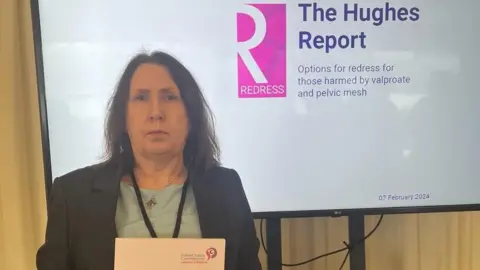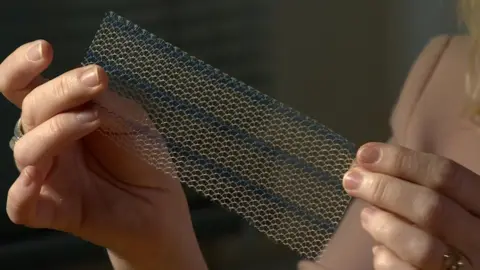Mesh scandal: NI victims need payout says campaigner
 Mary McLaughlin
Mary McLaughlinThe Northern Ireland Executive should set up a scheme to pay compensation to women injured by pelvic mesh implants, a campaigner has said.
Mary McLaughlin, from Mesh Ireland, was in London to hear England's patient safety commissioner recommend women there be given urgent financial help.
She told BBC News NI she is among thousands who had been left injured after having a mesh implant fitted.
Ms McLaughlin added many had lost jobs, homes and marriages.
Speaking on behalf of the English watchdog, Dr Henrietta Hughes recommended initial payments of £20,000 should be made to women injured by mesh implants.
She added that this should be followed by further payments for some, as well as some non-financial assistance to victims and their families,.
A Department of Health spokesperson said it was aware of the ongoing work of the Patient Safety Commissioner for England.
It added the department will "take time to consider its report and findings in due course, including in relation to financial and non-financial redress".

What is pelvic mesh?

For years, pelvic mesh was considered to be the gold standard treatment for incontinence and prolapse in women.
However, the net-like implant can erode and harden, cutting through tissue and causing serious pain.
Thousands of women who have experienced life-changing complications have lost their mobility, relationships and jobs.

In 2018, a specially-accredited unit was set up in Northern Ireland to deal with women who are coping with problems resulting from vaginal mesh implants.
"The women are hopeless, I have women who are suicidal on the phone to me, they are looking for a glimmer of hope," Ms McLaughlin.
"We are hoping the Executive will take on board the report and Northern Ireland will start setting up its scheme for our people to be compensated and looked after."
'Breakthrough'
Ms McLaughlin added she hoped the recommendations in England represented a "breakthrough".
"It is time the government steps up and takes responsibility, they brought theses implants into our system, they have destroyed our bodies, the women have to live with that," she said.
"Just because the women are getting into their 50s and 60s and 70s , we shouldn't be discriminated against because we are going to die soon."
The patient safety commissioner recommendations in England follow an independent UK review into three different treatments - Primodos, sodium valproate and pelvic mesh - affecting hundreds of thousands of women and babies which was published last year.
The Cumberlege review, titled First Do No Harm, concluded many lives had been ruined because officials failed to hear women's concerns.
More than 700 women and their families shared "harrowing" details about their experiences.
Among its conclusions it said that "arrogant attitudes left women traumatised, intimidated and confused".
Women 'moved to England' for treatment

Susan McLarnon has been left in constant pain since she had vaginal mesh inserted in 2016.
She said there were women who had sold their houses and moved to England to get treatment.
She said her group was pleased that the report "validated our suffering" however she added that members felt the initial payment of £20,000 to £25,000 was "disappointingly low".
However she added that the second stage payments for "those women directly harmed will compensate for that".
"We told this was gold standard with no long lasting problems so no one actually gave informed consent as they weren't given the full details," she told the BBC's Good Morning Ulster.
She urged Health Minister Robin Swann to move as quickly as possible when considering the report.
"I know Mr Swann has a lot on his plate and he will look into it but I would ask him to reduce that time as much as possible as people are suffering," she added.
A number of women from Northern Ireland previously spoke to the BBC about how mesh implants had left them physically and mentally scarred.
They described how the mesh had cut into the vagina causing severe discomfort.
While official figures show that about 7,000 women have had vaginal mesh implants, it is unclear how many have been adversely affected.
